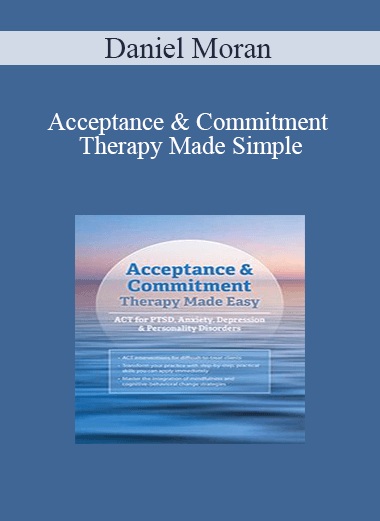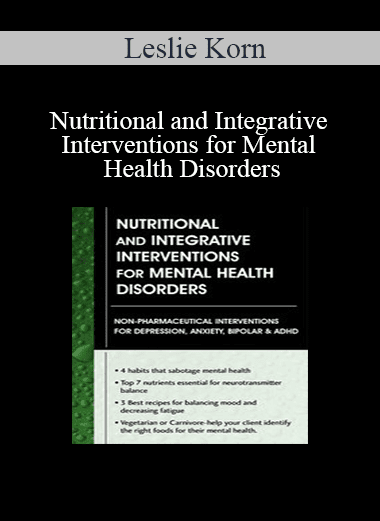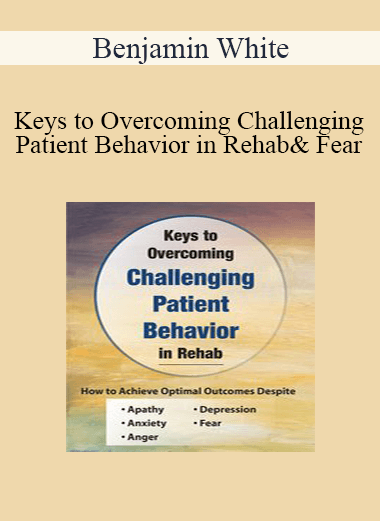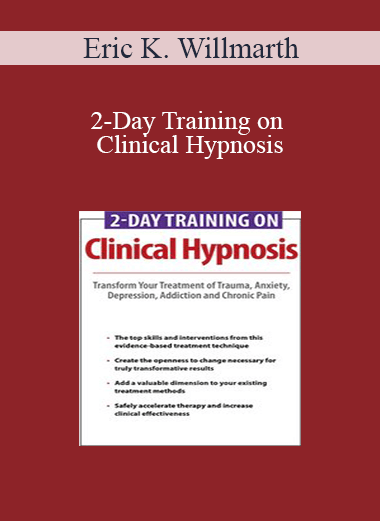Daniel Moran – Acceptance & Commitment Therapy Made Simple: ACT for PTSD, Anxiety, Depression & Personality Disorders
$219.99 Original price was: $219.99.$43.00Current price is: $43.00.
[Instant Download] – You will receive instant download access after the purchase
- Faculty:
- Daniel Moran
- Duration:
- 5 Hours 57 Minutes
- Format:
- Audio and Video
- Copyright:
- Oct 17, 2019
Description
| Manual – Acceptance & Commitment Therapy Made Easy (2.00 MB) | 34 Pages | Available after Purchase |
Outline
The ACT Model
- Pain vs. suffering
- Language as a double-edged sword
- Goal: Psychological flexibility
- Limitations of the research & potential risks
Components of the ACT Model
Acceptance: Foster Client Acceptance of Emotions to Increase Values-Based Action
- What should be accepted?
- The problem with controlling thoughts
- How to sidestep the happiness trap
- Spot common phrases of non-acceptance
- Experiential avoidance
- How to help clients understand acceptance
- Experiential Exercise: The finger trap
Defusion: Change the Way Clients Interact with Their Thoughts
- Relational frame theory & mental health
- Undermine unhelpful language processes
- Give clients skills to notice their thoughts
- How to decrease believability of unhelpful thoughts
- Experiential Exercise: Notice the meaning of language
Self-As-Context: Aid Clients in Establishing Their Identities
- The three different versions of the self
- How to describe the “observer self” to clients
- How to distance the self from thoughts & emotions
- The chess board metaphor
- Experiential Exercise: ”I am” exercise
Contact with the Present Moment: Strategies to Build Attention to the Here & Now
- How language affects mindfulness
- Goals of mindfulness
- ThoughtFit exercises
- How do we teach clients to be mindful?
- How to build focus on values
- Obstacles in teaching mindfulness
- Experiential Exercise: Mindfulness meditation
Values: Aid Clients in Deciding What Gives Live Meaning
- What are values?
- How to help clients author their values
- Values vs. goals
- When clients are “stuck”
- Values assessment
- Batteries exercise
- Epitaph exercise
Committed Action: Assist Clients in Behaving in the Service of Chosen Values
- Persistent inaction, impulsivity or avoidance
- Address rule-governed behavior
- Exposure & ritual prevention strategies
- The Mindful Action Plan
ACT in Action
PTSD
- Function of trauma symptoms
- Experiential avoidance in PTSD
- Increase psychological safety
- Dominating concepts of the past & future
- Trauma-informed mindfulness exercises
Anxiety
- Client avoidance & escape strategies
- Assessment tools
- Address reason-giving as a barrier
- Strategies to increase willingness
- Anxiety Detector exercise
Depression
- Values contradiction
- How experiential avoidance impacts depression
- Fusion to the damaged conceptualized self
- Behavioral activation strategies
Personality Disorders
- Coping strategies
- Increase emotional tolerance
- Target the client’s story
- Experiential avoidance from the therapist
Faculty

Daniel Moran, PhD, BCBA-D Related seminars and products: 7
Daniel J. Moran, PhD, BCBA-D, is the former president of the Association for Contextual Behavioral Science (ACBS), the international ACT organization with over 8,000 members worldwide. He co-authored the first case conceptualization manual for Acceptance and Commitment Therapy entitled ACT in Practice (New Harbinger) and served on the first ACT training committee. He also recently published Committed Action in Practice (New Harbinger) and will be bringing the topic of that book to this workshop.
As a recognized ACT Trainer in the ACBS community, Dr. Moran has an engaging training style that has led him to be an invited keynote speaker for many events in the last decade. He has also been featured on the Oprah Winfrey Network, TLC and The Discovery Channel discussing the treatment of many clinical disorders. He has published several articles and book chapters, including publications with CBT pioneer Albert Ellis and ACT pioneer Steven Hayes.
Dr. Moran supervises therapists around the world to help them treat patients in their clinics. His passion is for applying the ACT principles in important areas outside of the clinic, such as the boardroom or construction sites. He established Pickslyde Consulting in order to bring mindfulness and value-directed commitment skills to the workplace to improve safety, innovation and leadership. Dr. Moran has utilized ACT in work implementations and clinical training sites on six continents and in all 50 of the United States.
Speaker Disclosures:
Financial: Daniel Moran founded Pickslyde Consulting. He is an author for New Harbinger and receives royalties. Dr. Moran receives a speaking honorarium from PESI, Inc.
Nonfinancial: Daniel Moran is a member of the Association for Contextual Behavioral Sciences.
Delivery Method
– After your purchase, you’ll see a View your orders link which goes to the Downloads page. Here, you can download all the files associated with your order.
– Downloads are available once your payment is confirmed, we’ll also send you a download notification email separate from any transaction notification emails you receive from imcourse.digital.
– Since it is a digital copy, our suggestion is to download and save it to your hard drive. In case the link is broken for any reason, please contact us and we will resend the new download link.
– If you cannot find the download link, please don’t worry about that. We will update and notify you as soon as possible at 8:00 AM – 8:00 PM (UTC+8).
Thank You For Shopping With Us!
Be the first to review “Daniel Moran – Acceptance & Commitment Therapy Made Simple: ACT for PTSD, Anxiety, Depression & Personality Disorders” Cancel reply
Related Products
Medical & Health
Medical & Health
Medical & Health
Spirituality & Religion

![[Audio Download] BT16 Clinical Demonstration 01 - Experiential Adaptations - Jeffrey Zeig](https://imcourse.digital/wp-content/uploads/2022/02/Audio-Only-BT16-Clinical-Demonstration-01-Experiential-Adaptations-Jeffrey-Zeig-PhD-100x100.png)
![[Audio Download] EP85 Workshop 17 - Family Therapy - Salvador Minuchin](https://imcourse.digital/wp-content/uploads/2022/02/Audio-Only-EP85-Workshop-17-Family-Therapy-Salvador-Minuchin-M.D.-100x100.png)








![[Audio Download] BT14 Short Course 18 - Exploring the Impact of Milton Erickson and Steve Deshazer's Work with Regard to Depression](https://imcourse.digital/wp-content/uploads/2022/02/Audio-Only-BT14-Short-Course-18-Exploring-the-Impact-of-Milton-Erickson-and-Steve-Deshazers-Work-with-Regard-to-DepressionAnxiety-and-Trauma-Mike-Rankin-MA-and-Dale-Bertram-PhD.png)

9 reviews for Daniel Moran – Acceptance & Commitment Therapy Made Simple: ACT for PTSD, Anxiety, Depression & Personality Disorders
There are no reviews yet.